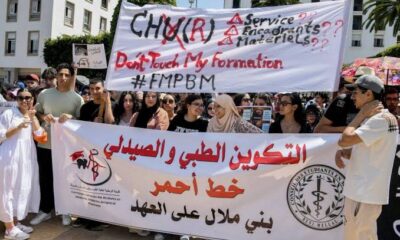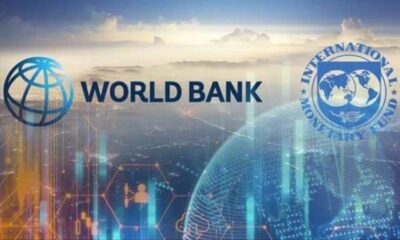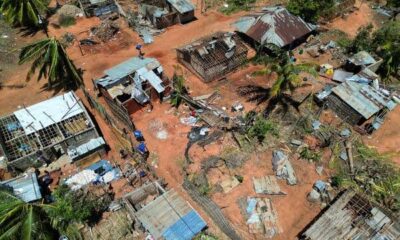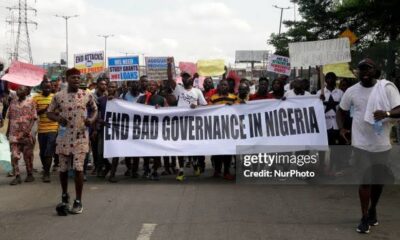Strictly Personal
Meeting Obasanjo, Tshisekedi at Congo battlefield by Festus Adebayo
Published
2 years agoon

Democratic Republic of Congo (DRC’s) Presidential Villa is a highly fortified palace. Like in many parts of Central Africa, the Congolese have turned their disadvantaged hilly and mountainous topography into aesthetic wonder. At every point in the expansive Villa, you confront menacing-looking, gun-toting soldiers who radio authorities before allowing you entry. White-painted effigies of four lions by the Villa gate compliment this menacing ambiance. The Villa itself is an old but well-maintained structure painted white and probably built in the 1970s. The language barrier limited the satisfaction of my curiosity as to whether Mobutu Sese-Seko ruled from this same Villa.
That perhaps is where the aesthetics end. Like Nigeria, DRC is in dire security straits. In features, both countries are twined like Siamese twins, as if from the same umbilical cord. While Nigeria is the most populous country in Africa, DRC has the largest land mass on the continent. With its 2,344,860 km square, compared to Nigeria’s 923,770 km square, Congo is more than twice of Nigeria’s land mass. It also has two time zones. Blessed with abundant mineral resources, since gaining independence, however – again same time in 1960 – both countries have been challenged by the scant supply of leadership. As a result, Nigeria and Congo are a caricature of Providence’s design for them as Eldorado. Since 1960, they have not been able to appropriate their humongous God-given resources.
As Nigeria suffocates under the apparently superior firepower of Boko Haram insurgents and bandits, DRC is muzzled by an armed militia group called the M23. While M23 operates in the eastern flank of the DRC, Nigerian terrorists’ domicile is in its Northern part. Between mid-June and July 2022, M23 summarily executed at least 29 civilians in Congo while in Nigeria, thousands of lives have been tethered by the bloodthirsty grove of terrorists.
In the midst of this tension, it was thus a pleasant surprise last Tuesday to see Nigeria’s military General and two-term president, Olusegun Obasanjo, at the DRC Presidential Villa. He was a guest of President Felix Tshisekedi.
Armed with a background of the unpleasant time the DRC seat of power was going through in the hands of rebels, Obasanjo’s presence raised some rebuttable conclusions that he had come as an amicus curia of sort of the Congolese government, in its time of tribulation. A top Congolese government source indeed confirmed to me that Obasanjo had been invited to help mediate the DRC crises with the M23.
Having been in Kinshasa on a different assignment, ferreting out what Obasanjo was about became my preoccupation. My reportorial instinct and logic, added to the quip from my source, made me agree that the august visitor had indeed come on that mission. Former UN Secretary-General, Ban Ki-Moon, had in November 2008 appointed Obasanjo as peace envoy to the DRC. Obasanjo’s task was to mediate a deal between regional antagonists like M23 and the government. Global apprehension had been on the upsurge that, if not urgently trapped, the tens of thousands of civilians who fled into camps as a result of violent activities of the militia might be in jeopardy. In that assignment, Obasanjo worked with the African Union to tease out a peace deal between the Congolese government and eastern Congo Tutsi rebels, as well as the Rwandan government, suspected to be their funder.
Also, Obasanjo, as current UN High Representative for the Horn of Africa, has been playing a huge mediative role in the ongoing Ethiopian crisis, a role assigned to him by the African Union (AU). A few weeks ago, specifically on August 4, the Ethiopian media reported that Obasanjo briefed the Peace and Security Council (PSC) on the Ethiopian crisis and what he had done after PSC’s last meeting. As High Representative, he had earlier briefed the AU during its 1064th session held in February. In June, Obasanjo had flown to Ethiopia to interact with Tigray’s Regional State President, Dr. Debretsion Gebremichael, and his Ethiopian counterpart, the country’s first female president, Sahle-Work Zewde.
M23 is a codename for the March 23 Movement or the Congolese Revolutionary Army. It is a rebel military group of mostly Tutsi ethnic groups that operates in the province of North Kivu. It was given birth on March 23, 2009. Since its founding, M23 has terrorized DRC. Between 2012 and 2013, its attacks led to the displacement of thousands of people. On November 20, 2012, it annexed Goma, the capital of the Province of North Kivu, with its over a million population. The rebels were however repelled a few weeks after by the Congolese army, fighting alongside UN troops and retook control of Goma. In its report on the crisis, the UN stated that Paul Kagame, whose Rwanda borders DRC, was the sole sponsor of the rebellion. M23 resumed its offensive in 2017 and, about two months ago, captured the DRC border town of Bunagana. Though Kagame withdrew his support for M23 after intense international pressure in 2012, he is alleged to have meandered back into sponsoring the rebels. Ugandan army commanders were also alleged by the UN to have reinforced the rebels with troops and weapons, as well as assisted them with recruiting soldiers.
On June 21, 2022, as the rebels fought Congolese forces in Ruvumu, a village in the eastern province, the M23 rebels allegedly summarily executed about 17 civilians, a figure that included two teenagers. It executed even more within a spate of two weeks. The guilt of the victims was that they allegedly acted as informants to the Congolese army about the rebels’ whereabouts. Some other civilians got shot dead as they fled, with others executed at close range. Both the M23 rebels and the Congolese army-backed UN troops fighting in North Kivu have been alleged to have deployed explosive weapons like mortar fire and artillery shelling in their fights, which most times hit civilians and civilian structures.
There is no government worth its onions that would not be bothered by the incursion of the M23 into its territory. President Tshisekedi surely is. Congo is the richest country in Africa. Those scary mountains of its are reputed to hide inside their bellies huge reserves of cobalt, gold, gems, copper, timber, and uranium. Its most valuable resource is its large reserve of diamonds. Indeed, the Congo has the world’s second-largest diamond reserves, at 150Mct, or 20.5% of the global total. Substantial diamond reserves can be found in Kasai Occidental and Kasai Oriental.
At about 10a.m, he was ushered into the expansive and chic waiting room of President Tshisekedi by one of the Congolese president’s envoys, Pacifique KashashaBirinda. A few minutes after, he was led to the office of Tshisekedi, with press photographers alone allowed to take shots of their immediate convivial exchanges. Thereafter, the press was asked to excuse them. After about two hours of talks, Obasanjo and Pacifique came out to address a battery of Congolese and Nigerian journalists waiting for them.
Obasanjo and Tshisekedi met for about two hours. Immediately Obasanjo came out of the meeting to address the press, my question to him was why he was in Congo and what he and Tshisekedi discussed. Chaperoned by Pacifique, who also acted as his interpreter, the old warhorse however filibustered of sort as his response was omnibus. He brushed it off in diplomatese.
As the International Institute of Tropical Agriculture, (IITA) Ambassador, Obasanjo, on his way to the airport to fly back to Lagos, visited the institute’s expansive acres of citrus and cassava farm located on the outskirts of Kinshasa. Asked again why he had come to DRC, he said, among others, that he came to congratulate Tshisekedi as the newly appointed Chairman of SADC.
Obasanjo further espoused how agricultural security, through agribusiness, can bring food to the table in Africa and how the misbehavior on the part of the youths is due to a lack of employment. One sector that can provide this security, he said, is agribusiness. He lauded IITA and its DRC-born Director General, Dr. NterenyaSanginga, for the institute’s contributions to food security in Africa and said that from what he had seen, especially in IITA-pioneered cassava farming, he would copy it in his farm in Nigeria. He said that the ongoing war in Ukraine exposed a huge gap in Africa’s agriculture, revealing that Africa depends on Ukraine and Russia for a great chunk of its wheat consumption. However, according to him, he was gladdened when, on a recent visit to Ethiopia, he was told that the country, in the next two years, would not only be self-sufficient in wheat production but would be a net importer of wheat.
The day before this, in the evening of Obasanjo’s second day in the DRC, President Tshisekedi had hosted him and his entourage to a sumptuous dinner beside his presidential palace overlooking River Congo. On the other side of the river, about a few kilometers, was Congo Brazzaville; the river being nature’s own way of bifurcating the two different nations. As we all waited for Tshisekedi, he appeared in a dark brown flown shirt, brown trousers, and black slippers at exactly 6.02 pm. A Congolese band was on standby to scintillate the audience. Obasanjo moved his body in consonance with the beat on the high table where he sat. At some point, Obasanjo and Tshisekedi again walked backstage and engaged each other in another round of mutual tete-a-tete for about 30 minutes.
A man many love to loathe, students of theology must be studying what the spiritual balm that makes OlusegunObasanjo tick is. As he landed in Lagos on Wednesday, right from the Presidential Wing of the Murtala Muhammed Airport, Obasanjo was reported to have again jetted to London. It was only the second day that pictures of him and Nigerian politicians in another round of rapprochement surfaced in the media. The curious question to ask is why the world is inviting the old warhorse to mediate in their crises but Obasanjo’s peacemaking talent is pining away in the Nigerian backyard. Or, are those inviting Obasanjo foolish and Nigerian current leaders, wisdom personified?
You may like
-


Let’s merge EAC and Igad, By Nuur Mohamud Sheekh
-


African Union must ensure Sudan civilians are protected, By Joyce Banda
-


Economic policies must be local, By Lekan Sote
-


Dangote Refinery: A timely win for industrialisation, By Abiodun Alade
-


Mpox crisis: We need an equity-driven pandemic treaty, By Magda Robalo
-


Olympics had free lessons for African leaders, By Tee Nugugi
Strictly Personal
Let’s merge EAC and Igad, By Nuur Mohamud Sheekh
Published
4 weeks agoon
November 27, 2024
In an era of political and economic uncertainty, global crises and diminishing donor contributions, Africa’s regional economic communities (RECs) must reimagine their approach to regional integration.
The East African Community (EAC) and the Intergovernmental Authority on Development (Igad), two critical RECs in East Africa and the Horn of Africa have an unprecedented opportunity to join forces, leveraging their respective strengths to drive sustainable peace and development and advance regional economic integration and promote the African Continental Free Trade Area (AfCFTA).
Already, four of the eight Igad member states are also members of the EAC and, with Ethiopia and Sudan showing interest, the new unified bloc would be formidable.
Igad’s strength lies in regional peacemaking, preventive diplomacy, security, and resilience, especially in a region plagued by protracted conflicts, climate challenges, and humanitarian crises. The EAC, on the other hand, has made remarkable strides in economic integration, exemplified by its Customs Union, Common Market, and ongoing efforts toward a monetary union. Combining these comparative advantages would create a formidable entity capable of addressing complex challenges holistically.
Imagine a REC that pairs Igad’s conflict resolution strengths with the EAC’s diplomatic standing and robust economic framework. Member states of both are also contributing troops to peacekeeping missions. Such a fusion would streamline efforts to create a peaceful and economically prosperous region, addressing the root causes of instability while simultaneously promoting trade investment and regional cooperation.
These strengths will be harnessed to deal with inter-state tensions that we are currently witnessing, including between Ethiopia and Somalia over the Somaliland MoU, strained relations between Djibouti and Eritrea, and the continually deteriorating relations between Eritrea and Ethiopia.
The global economy experienced as a result of the COVID-19 pandemic, compounded by the Ukraine war and competing global crises, has strained donor countries and reduced financial contributions to multilateral organisations and African RECs. Member states, many of which are grappling with fiscal constraints, are increasingly unable to fill this gap, failing to make timely contributions, which is in turn affecting key mandate areas of Igad and EAC, and staff morale.
A merger between Igad and EAC would alleviate this financial pressure by eliminating redundancies. Shared administrative systems, integrated programmes, and a unified leadership structure would optimise resources, enabling the new REC to achieve more with less. Staff rationalisation, while sensitive, is a necessary step to ensure that limited funds are channelled toward impactful initiatives rather than duplicative overheads.
The African Union (AU) envisions a fully integrated Africa, with RECs serving as the building blocks of the AfCFTA. A unified EAC-Igad entity would become a powerhouse for regional integration, unlocking economies of scale and harmonising policies across a wider geographical and economic landscape.
This merger would enhance the implementation of the AfCFTA by creating a larger, more cohesive market that attracts investment, fosters innovation, and increases competitiveness. By aligning trade policies, infrastructure projects, and regulatory frameworks, the new REC could serve as a model for others, accelerating continental integration.
The road to integration is not without obstacles. Political will, divergent institutional mandates, and the complexity of harmonising systems pose significant challenges. However, these hurdles are surmountable through inclusive dialogue, strong leadership, and a phased approach to integration.
Member states must prioritise the long-term benefits of unity over short-term political considerations. Civil society, the private sector, the youth, and international partners also have a critical role to play in advocating for and supporting this transformative initiative.
The time for EAC and Igad to join forces is now. By merging into a single REC, they would pool their strengths, optimise resources, and position themselves as a driving force for regional and continental integration. In doing so, they would not only secure a prosperous future for their citizens and member states but also advance the broader vision of an integrated and thriving Africa.
As the world grapples with crises, Africa must look inward, embracing the power of unity to achieve its potential. A combined Igad-EAC is the bold step forward that the continent needs.
Nuur Mohamud Sheekh, a diplomatic and geopolitical analyst based in London, is a former spokesperson of the Igad Executive Secretary. X: @NuursViews
Strictly Personal
Budgets, budgeting and budget financing, By Sheriffdeen A. Tella, Ph.D.
Published
1 month agoon
November 20, 2024
The budget season is here again. It is an institutional and desirable annual ritual. Revenue collection and spending at the federal, State and local government levels must be authorised and guided by law. That is what budget is all about. A document containing the estimates of projected revenues from identified sources and the proposed expenditure for different sectors in the appropriate level of government. The last two weeks have seen the delivery of budget drafts to various Houses of Assembly and the promise that the federal government would present its draft budget to the National Assembly.
Do people still look forward to the budget presentation and the contents therein? I am not sure. Citizens have realised that these days, governments often spend money without reference to the approved budget. A governor can just wake up and direct that a police station be built in a location. With no allocation in the budget, the station will be completed in three months. The President can direct from his bathroom that 72 trailers of maize be distributed to the 36 states as palliatives. No budget provision, and no discussion by relevant committee or group.
We still operate with the military mentality. We operated too long under the military and of the five Presidents we have in this democracy, two of them were retired military Heads of State. Between them, they spent 16 years of 25 years of democratic governance. Hopefully, we are done with them physically but not mentally. Most present governors grew up largely under military regimes with the command system. That is why some see themselves as emperor and act accordingly. Their direct staff and commissioners are “Yes” men and women. There is need for disorientation.
The importance of budget in the art of governance cannot be overemphasized. It is one of the major functions of the legislature because without the consideration and authorisation of spending of funds by this arm of government, the executive has no power to start spending money. There is what we refer to as a budget cycle or stages. The budget drafting stage within the purview of the executive arm is the first stage and, followed by the authorisation stage where the legislature discusses, evaluates and tinkers with the draft for approval before presenting it to the President for his signature.
Thereafter, the budget enters the execution phase or cycle where programmes and projects are executed by the executive arm with the legislature carrying out oversight functions. Finally, we enter the auditing phase when the federal and State Auditors verify and report on the execution of the budgets. The report would normally be submitted to the Legislature. Many Auditor Generals have fallen victim at this stage for daring to query the executives on some aspects of the execution in their reports.
A new budget should contain the objectives and achievements of the preceding budget in the introduction as the foundation for the budget. More appropriately, a current budget derives its strength from a medium-term framework which also derives its strength from a national Development Plan or a State Plan. An approved National Plan does not exist currently, although the Plan launched by the Muhammadu Buhari administration is in the cooler. President Tinubu, who is acclaimed to be the architect of the Lagos State long-term Plan seems curiously, disillusioned with a national Plan.
Some States like Oyo and Kaduna, have long-term Plans that serve as the source of their annual budgets. Economists and policymakers see development plans as instruments of salvation for developing countries. Mike Obadan, the former Director General of the moribund Nigeria Centre for Economic and Management Administration, opined that a Plan in a developing country serves as an instrument to eradicate poverty, achieve high rates of economic growth and promote economic and social development.
The Nigerian development plans were on course until the adoption of the World Bank/IMF-inspired Structural Adjustment Programme in 1986 when the country and others that adopted the programme were forced to abandon such plan for short-term stabilisation policies in the name of a rolling plan. We have been rolling in the mud since that time. One is not surprised that the Tinubu administration is not looking at the Buhari Development Plan since the government is World Bank/IMF compliant. It was in the news last week that our President is an American asset and by extension, Nigeria’s policies must be defined by America which controls the Bretton Woods institutions.
A national Plan allows the citizens to monitor quantitatively, the projects and programmes being executed or to be executed by the government through the budgeting procedure. It is part of the definitive measures of transparency and accountability which most Nigerian governments do not cherish. So, you cannot pin your government down to anything.
Budgets these days hardly contain budget performance in terms of revenue, expenditure and other achievements like several schools, hospitals, small-scale enterprises, etc, that the government got involved in successfully and partially. These are the foundation for a new budget like items brought forward in accounting documents. The new budget should state the new reforms or transformations that would be taking place. Reforms like shifting from dominance of recurrent expenditure to capital expenditure; moving from the provision of basic needs programmes to industrialisation, and from reliance on foreign loans to dependence on domestic fund mobilisation for executing the budget.
That brings us to the issue of budget deficit and borrowing. When an economy is in recession, expansionary fiscal policy is recommended. That is, the government will need to spend more than it receives to pump prime the economy. If this is taken, Nigeria has always had a deficit budget, implying that we are always in economic recession. The fact is that even when we had a surplus in our balance of payment that made it possible to pay off our debts, we still had a deficit budget. We are so used to borrowing at the national level that stopping it will look like the collapse of the Nigerian state. The States have also followed the trend. Ordinarily, since States are largely dependent on the federal government for funds, they should promote balanced budget.
The States are like a schoolboy who depends on his parents for school fees and feeding allowance but goes about borrowing from classmates. Definitely, it is the parents that will surely pay the debt. The debt forgiveness mentality plays a major role in the process. Having enjoyed debt forgiveness in the past, the federal government is always in the credit market and does not caution the State governments in participating in the market. Our Presidents don’t feel ashamed when they are begging for debt forgiveness in international forum where issues on global development are being discussed. Not less than twice I have watched the countenance of some Presidents, even from Africa, while they looked at our president with disdain when issues of debt forgiveness for African countries was raised.
In most cases, the government, both at the federal and state cannot show the product of loans, except those lent by institutions like the World Bank or African Development Bank for specific projects which are monitored by the lending institutions. In other cases, the loans are stolen and transferred abroad while we are paying the loans. In some other cases, the loans are diverted to projects other than what the proposal stated. There was a case of loans obtained based on establishing an international car park in the border of the State but diverted to finance the election of a politician in the State. The politician eventually lost the election but the citizens of the State have to be taxed to pay the loan. Somebody as “Nigeria we hail thee”.
Transformation in budgeting should commence subsequently at the State and federal level. Now that local government will enjoy some financial autonomy and therefore budgeting process, they should be legally barred from contracting foreign loans. They have no business participating in the market. They should promote balanced budget where proposed expenditures must equal the expected revenues from federal and internal sources. The State government that cannot mobilise, from records, up to 40 percent of its total budget from IGR should not be supported to contract foreign loans. The States should engage in a balanced budget. The federal government budget should shift away from huge allocations to recurrent expenditure towards capital expenditure for capital formation and within the context of a welfarist state.
Sheriffdeen A. Tella, Ph.D.
EDITOR’S PICK


Moroccan doctors stage nationwide protest in ‘Week of Anger’
Moroccan doctors across the country on Tuesday staged a nationwide protests in what is known as “Week of Anger,” accusing...


Zambian drug agency declares ex-President Lungu’s daughter wanted
The Zambian Drug Enforcement Commission (DEC) has declared the daughter of former president Edgar Lungu, Tasila Lungu, wanted in connection...


‘Pray for leaders to serve you diligently,’ President Tinubu tells Nigerians
President Bola Tinubu has called on Nigerians to develop the habit of praying for their leaders to enable them serve...


World Bank doubts Ethiopia-IMF debt assessment
Some officials of the World Bank have questioned if the study supporting Ethiopia’s debt restructuring may be “faulty” after criticising...


Death toll from Cyclone Chido in Mozambique hits 94
he death toll from the Cyclone Chido which stuck Mozambique last week has risen to 94 with hundreds still missing....


Facebook returns to Uganda after 4-year ban
After four years of being in the cooler as a result of suspension by government, Facebook, now Meta, is making...


Nigeria on the right path despite hardship, criticism— President Tinubu
Nigerian President, Bola Ahmed Tinubu, has insisted that the country is moving in the right direction despite the criticism of...


Zambian NGO decries persistent corruption, says governance in 2024 marked by mixed fortunes
A Non-Governmental Organization in Zambia, the Gender Organizations Coordinating Council (NGOCC), has decried what it described as persistent corruption in...


Sad day for African football as promising Kenyan star passes on
he African football fraternity was thrown into mourning following the untimely demise of promising Kenyan striker, Ezekiel Otuoma, who died...


Nigeria: Police dismiss Amnesty Intl’s report on killing of protesters, demand apology
The Nigeria Police has rejected a report by Amnesty International that accused the force of killing protesters during the #Endbadgovernance...


